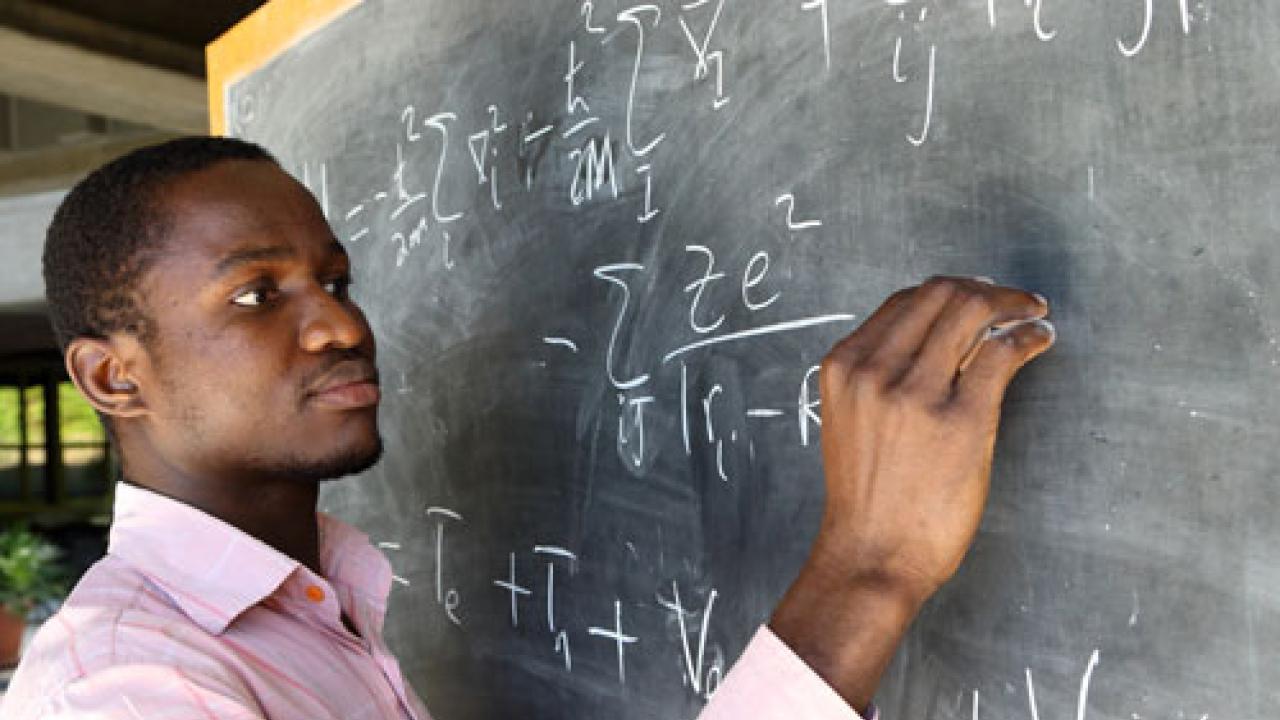
Yusuf Shaidu was not impressed with the quality of his secondary school education, but it inspired him all the same. "In the whole class, I was the only one who wanted to do science," Shaidu says, remembering being frustrated with how his math teacher presented concepts. Now finishing the ICTP Postgraduate Diploma Program in Condensed Matter Physics, Shaidu, originally from Edo state, Nigeria, hopes one day to do research and teach as a professor at a Nigerian university. "I would like to have the necessary background to impact the young generation," Shaidu says, adding that he hopes his work will improve teaching standards and help spread the excitement of science to more young students.
He's working hard on that necessary background, having excelled in his Diploma studies and been accepted to the joint ICTP-SISSA PhD program, which starts later this year. Shaidu is well-prepared for the hard work of doctoral studies, not only as a Diploma Program alum but also as a recipient of an earlier master's degree from the African University of Science and Technology (AUST) in Abuja, Nigeria, and a graduate of a three year teacher training program.
Shaidu’s road to becoming a scientist started with a basic love of math. "I have always liked to solve mathematics," Shaidu says. "My parents are not scientists; in fact, they don't have any formal education, and the primary and secondary education I received was not very good. I'm from the southern part of Nigeria, and my village is very small; most of the people are peasant farmers. But every time I encountered mathematics, I tried to understand it." His love of mathematics served him well when he decided to focus his studies on physics . “Actually, one cannot really do the field of physics that I'm in, without mathematics, because the language of communication in physics is through mathematics," he says.
It was at AUST where Shaidu first heard about ICTP; two of the Centre’s scientists—Nicola Seriani and Sandro Scandolo—had traveled there to lecture. "I was impressed by their teaching," Shaidu remembers. "I told myself, look, where these people are, I think I would like to be there." After applying to the competitive Diploma program and getting accepted, ICTP is where he is.
Nigeria's government has ambitious plans for science and technology in the country, with plans for a national science foundation and increased investment in education at all levels. But the recent track record for science in Nigeria has been mixed. While it has the highest scientific publication output of all the countries in the region, research in physics and mathematics is a tiny fraction of that. In addition, a recent government push for a research focus on the more-immediately applicable 'innovation', spells possible trouble for basic research funding. On top of that, the violence of the extremist group Boko Haram, literally meaning 'books are forbidden', operates in the north-eastern part of Nigeria, collapsing the educational system in the region and making building a knowledge economy difficult country-wide.
But Shaidu’s case is an encouraging one. His family supports his desire to further his studies: "There's a kind of trust," Shaidu says. "Whenever I say this is what I want to do, they make a lot of effort to encourage me. But none of them know where Italy is actually located." He describes how, after finishing his first degree, his family asked him to work instead of pursuing his master's degree. "I said, there is still a long way to go [with my science studies], please be patient with me. They agreed, and we were all happy with the very good results from my master's degree. They are always happy for me."
And Shaidu is quite happy with his studies, excited to stay in Trieste and start his PhD this fall at SISSA. His Diploma thesis investigates the theoretical basis behind ways to make lithium batteries longer lasting, more efficient, and cheaper. His detailed theoretical research could help the experimentalists better produce such efficient batteries, the materials scientists build better batteries, and the world in general be more efficient with its energy and materials.
This is the beginning of the education and background that Shaidu hopes to amass before returning to Nigeria as a professor, still passionate about skillful teaching as well as his research. "I've seen some irregularities in the way of teaching at all levels in Nigeria, and I'd like to be part of the team that will come up with ideas to improve it,” he says Two of Shaidu's siblings have followed him to university, in accounting and mechanical engineering. He's proud of both, but wishes they had considered studying science. "The way things are now, there are no good science teachers in the high schools in my region, so most students develop other interests. They will always tell you mathematics is difficult, or that they cannot do science, things like that."
Shaidu really admires the overall teaching skills of his ICTP professors: "Sometimes they explain a particular thing in such a way that, although I may have been taught it before but did not understand, now I'd just glance at it and pick it up." It's that kind of skill in teaching that Shaidu hopes to spread one day, leveraging it to inspire students to study science.













